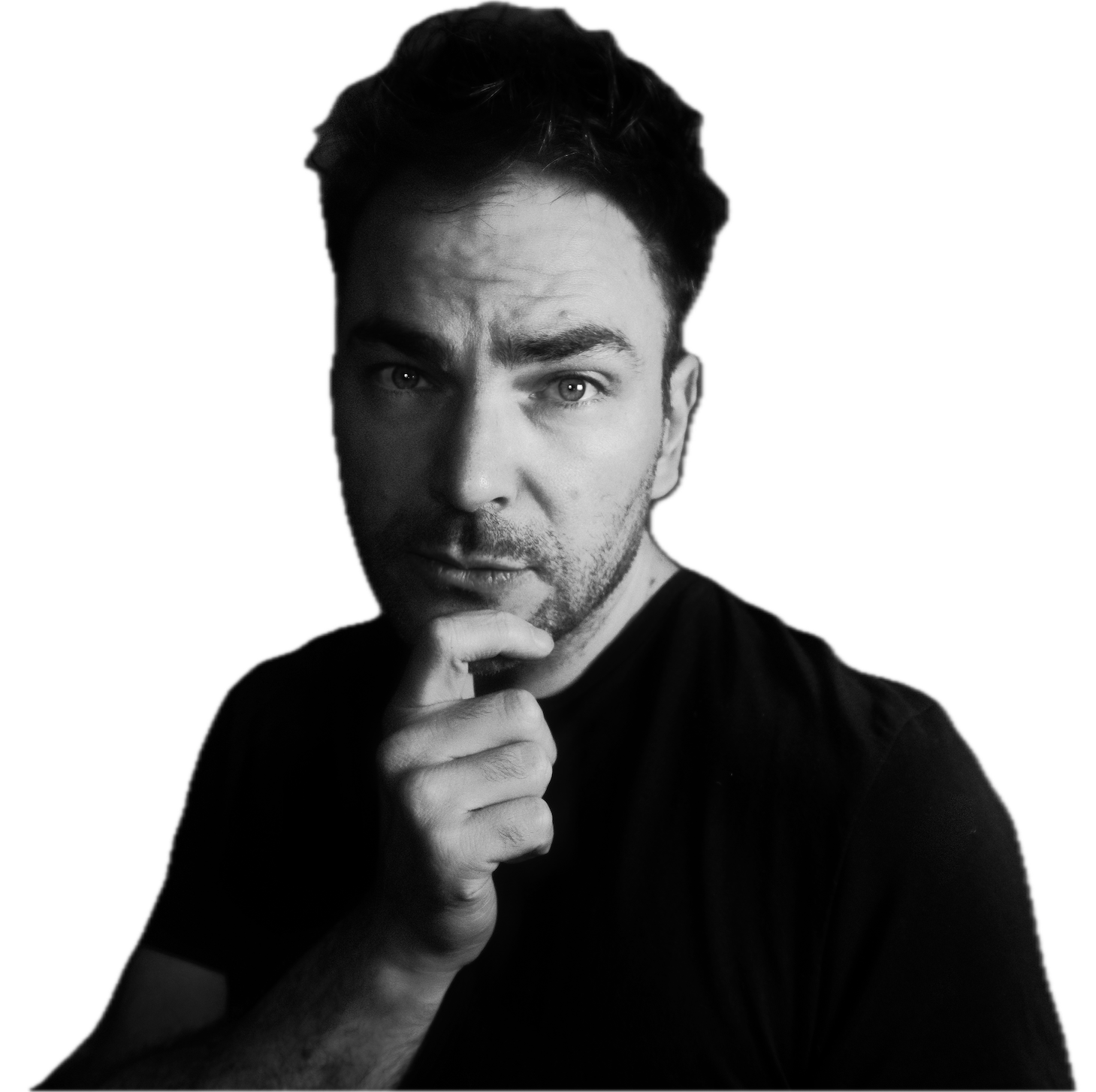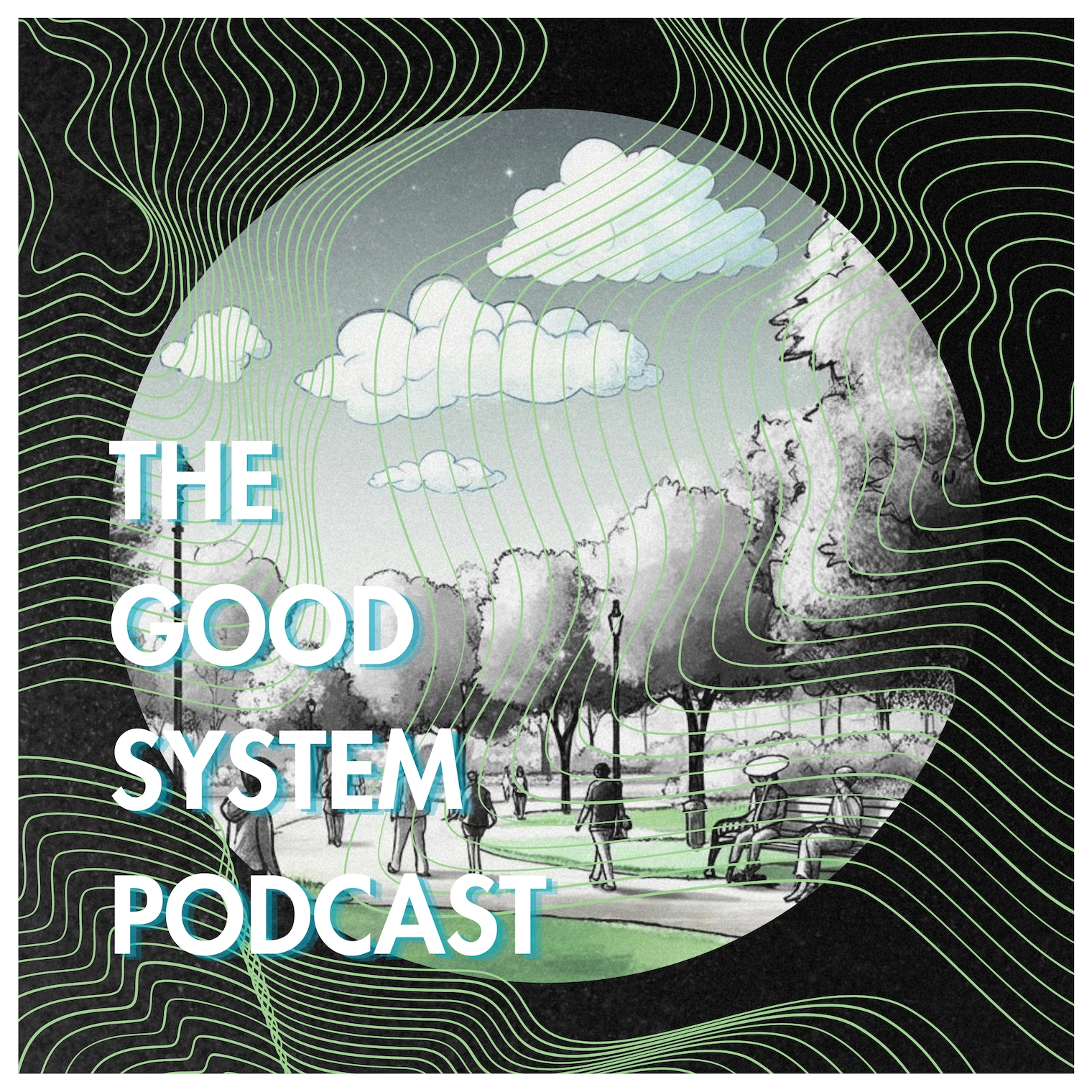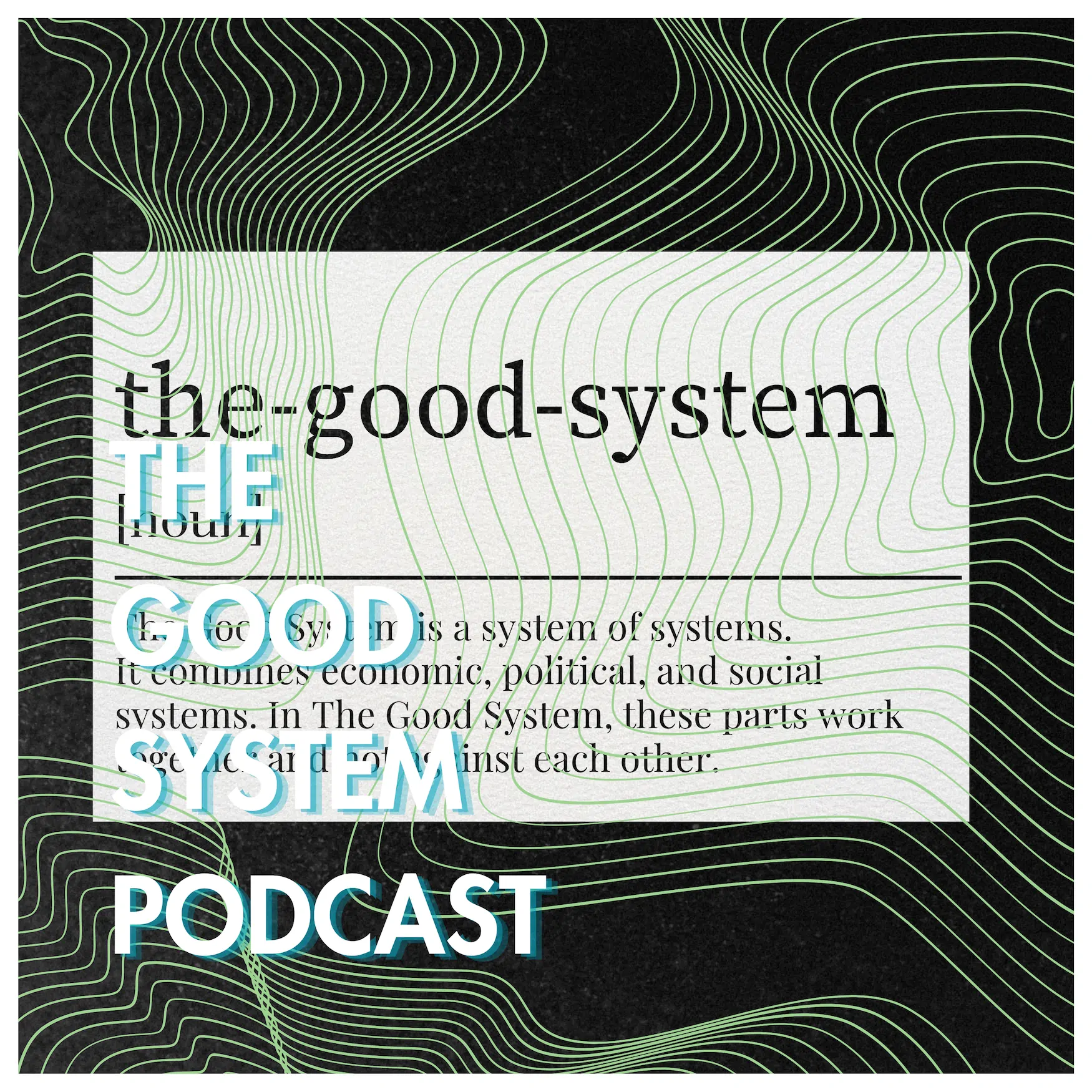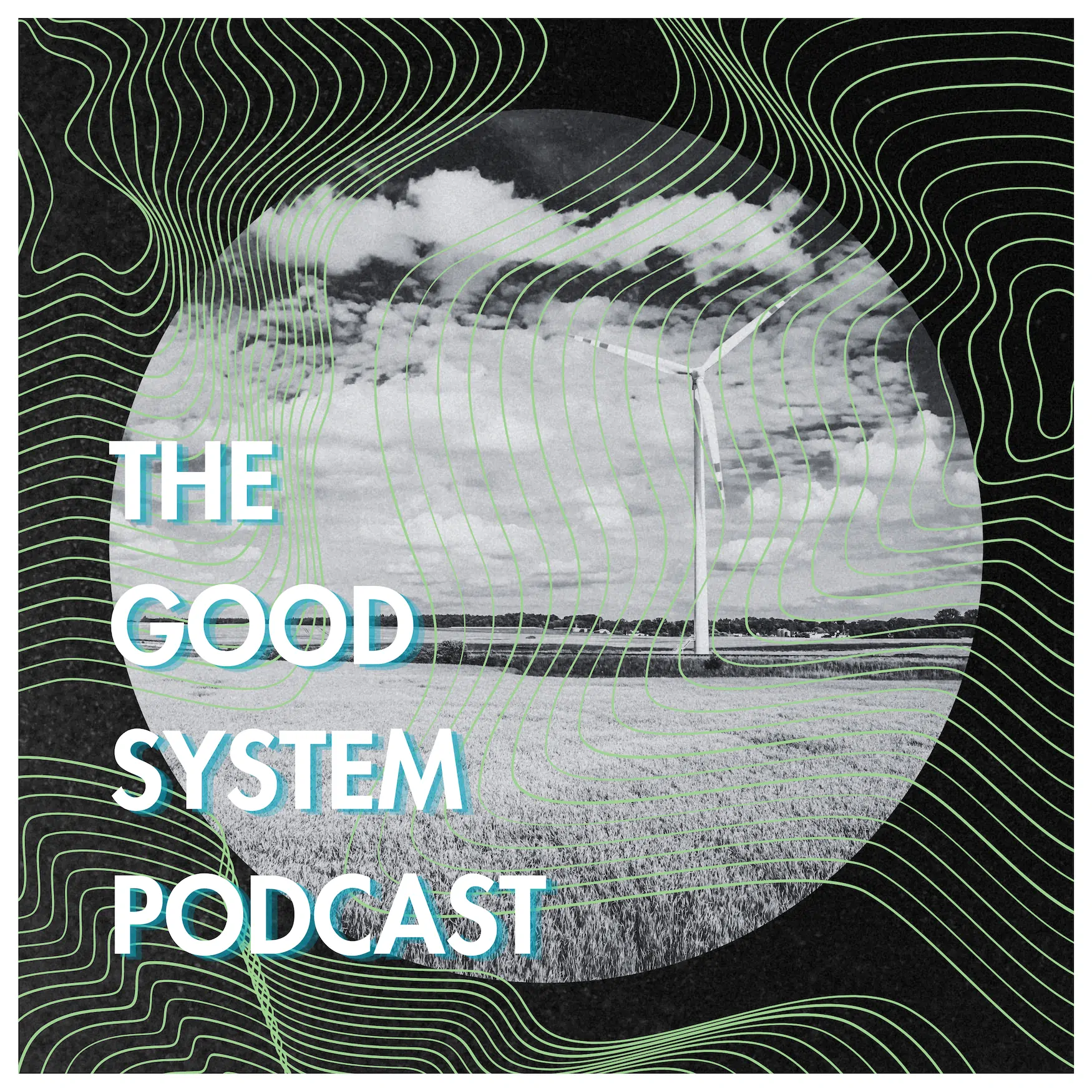Episode Transcript
[00:00:00] Have you ever tried to meet a friend without spending money and realized there's nothing to go?
[00:00:08] I certainly have.
[00:00:09] Welcome to late stage capitalism. I am Ian the Bay and this is the good system where we dissect what's broken and imagine how to fix it. Today we're talking about third places. The places where that aren't your home, aren't your work, but are absolutely essential for a functioning society.
[00:00:34] Last week I met an old friend downtown. We hadn't seen each other in months and we wanted to catch up. The plan was simple. Find a place to sit and talk for a couple of hours.
[00:00:46] Sounds easy, right? Yeah. Wrong. Every cafe had the same selling apple juice for 5 Euro because they only serve rich people.
[00:00:56] But I am a starving content creator.
[00:01:00] I mean I literally am.
[00:01:02] Could you please spend a dime?
[00:01:06] That would be nice.
[00:01:08] The natural habitat for failed content creators, also called park benches, were designed with that special anti homeless architecture that makes sitting for more than 10 minutes a spinal challenge. And. And the library closed at the weekend.
[00:01:27] No one want to work anymore. My friend took a pity on me and his spine. He invited me to a fancy €7 apple juice cafe.
[00:01:39] And that reminded me of a blog article I wrote a while ago on my blog, iandebay.com if you want to read it and it's about third spaces and that's good news for you. If you don't want to listen to me anymore, just read the blog article.
[00:02:00] But best case scenario for me would be if you listen to the podcast while reading the article that creates reach and this turns into money.
[00:02:12] Someday maybe.
[00:02:15] However, the link to my blog is in the show notes and you don't even have to read it. Just go to the website and have it open for several hours. But back to the topic third places. What are they? Why do we need them? And why do we seem to have fewer of them than our parents did? First off, let's get clear on what a third place actually is.
[00:02:40] It's not your home. That would be the first place. It's not your workplace or school. That's your second place. It's everywhere else, where people can gather, connect and exist without a specific agenda. There's actually some interesting academic work on this concept. The term third place was coined by sociologist Ray Oldenburg in his 1989 book The Great Good Place.
[00:03:10] He described these places as the heart of a community's social vitality.
[00:03:16] Places like coffee shops, parks, libraries and barbershops. Spots where rank and status matter less and conversation is the main activity and people feel a sense of warmth and belonging. I stumbled upon Olden Burke's work during one of my Doom scroll binge watch sessions on YouTube.
[00:03:42] By the way, I have three YouTube channels now and if you want to subscribe to them, you'll find the links in the show notes. It would help me a lot.
[00:03:54] Watching the videos about Oldenburg's book was eye opening, although my eyes were tired from all this binge watching. But Oldenburg described something I maybe felt. Maybe you have felt either, but I have never really realized it. This hunger for spaces that weren't commercialized or privatized, where human connection was the point.
[00:04:22] Now, of course, technically third places like bars and restaurants are commercialized and privatized.
[00:04:29] And they are very important because in many towns they are the only places where people come can come together.
[00:04:37] But I want to focus on the truly accessible ones. The places that don't require you to open your wallet to justify your existence. That the places where a broke college student, a retired teacher, and a family with young kids can all coexist. And no, before you ask, your car is not a third place.
[00:05:00] Despite what American culture might suggest, sitting alone in a metal box screaming at other drivers isn't exactly fostering community connection. Running over a cyclist is neither the right form of connection.
[00:05:15] Cars are a factor why we are missing first places and public spaces.
[00:05:22] They are private spaces occupying these public spaces. Remember when streets were places where people actually existed?
[00:05:32] I grew up in a neighborhood where kids played on the streets until the parents called them in for dinner. And now those same streets are just corridors for Amazon delivery trucks and Uber Eats drivers. Let me paint you a picture.
[00:05:49] I recently visited Krems, a town about an hour from Vienna.
[00:05:55] I visited it with my family and friends and we went to a restaurant in the pedestrian zone.
[00:06:01] And while the location itself was expensive, happily my wife paid.
[00:06:07] The streets were free.
[00:06:09] Our kids played around freely. They were running through the streets because they weren't just transportation corridors, they were living rooms. People sat on stoops chatting with neighbors. Kids played games in little pockets of space.
[00:06:25] Elderly folks had placed chairs outside their homes and formed impromptu social clubs.
[00:06:34] Coming back to Vienna was jarring. We had to remember our kids all the time to be cautious. They couldn't run around.
[00:06:41] All space we had left was the narrow strip called sidewalk. When did we decide to convert the public living rooms to living hell? There's this amazing quote I found on threads. Yes, I use Threads. Touch me if you must. Nowadays I am more on bluesky and if you want to connect, you find the links to my socials on my blog.
[00:07:08] But back to the thread. It if it doesn't make money, it doesn't exist to capitalists. And if it does exist, they kill it or make profit out of it.
[00:07:20] This hits the nail on the head for third places in our economic system. A piece of land that doesn't generate profit is considered wasted potential. A park bench where people sit and talk that could be a parking spot generating five euro an hour.
[00:07:39] A community garden that could be luxury condos.
[00:07:44] It's wild to me how completely we've internalized this logic.
[00:07:50] I caught myself doing it recently on my way to the date with my friend. I was walking on the sidewalk. A group of teenagers just hanging out there, laughing, being loud in that way teenagers are.
[00:08:04] And they are blocking the way because they were standing there.
[00:08:08] And my first thought was, I'm embarrassed to admit this, shouldn't they be somewhere else?
[00:08:16] And then I stopped myself.
[00:08:18] Where exactly should they be? The mall wants them to shop or leave. Coffee shops want them to buy expensive drinks. There was no park nearby. We've systematically. Is it to say it's systematically?
[00:08:34] You know, we've systematically eliminated the spaces where young people can just exist.
[00:08:46] No wonder they're glued to their phones. At least in digital spaces they're welcome. And you know what's fascinating to me? How our grandparents generation had these rich social lives centered around places that barely exist anymore. They had town squares, community centers, church halls, local diners where they could sit for hours or over a single cup of coffee.
[00:09:15] And I am lucky to live in Vienna, where the coffee house culture is glorified. So there still exist cafes and bars where you can sit for hours with a cup of coffee or beer.
[00:09:28] It just wouldn't taste good anymore because the coffee gets cold and the beer gets warm. Maybe you have to mix it to reach the perfect temperature again. But I don't know if coffee beer tastes good, but at least you could sit there for as long as. For as nearly as long as you want.
[00:09:51] But these places get fewer and fewer. So why are third places disappearing?
[00:09:57] Well, I've identified a few culprits.
[00:10:01] First, suburban sprawl.
[00:10:03] When we design communities around cars rather than people, we end up with these isolating landscapes where every destination requires driving. Main streets die because big box stores set up shops on the outskirts.
[00:10:21] And those big box stores, they are designed for efficiency, not lingering. Since I don't have a car, I rarely visit these big box stores when I need to go there. It is nearly impossible to do without car.
[00:10:38] But the stores in the neighborhood are closed because they couldn't survive the competition.
[00:10:43] And the big box stores will die soon too, because more and more people are living in cities and more and more people don't have a car.
[00:10:52] And that's why more and more people are ordering online instead of driving to the shopping center. All that remains are large concrete surfaces with buildings on them that can't be used for anything. The second reason why we have less third places is the rising costs of living.
[00:11:17] When both adults in a household need to work full time just to make rent, there's less time for community engagement. And when cafes have to charge €7 for a latte to cover their own insane rent, they can't afford to let people sit around all day.
[00:11:38] When old buildings get renovated, they are often gentrified and transformed to luxury apartments.
[00:11:46] That doesn't only raise the costs of living in the area.
[00:11:50] If there was a store or a bar before, it gets removed. Because you can't expect the new wealthy residents to be exposed to the background noise of a living city if they live there at all. Because the expensive apartments are often just an investment.
[00:12:08] The system is literally designed to prevent third places from thriving.
[00:12:13] Third the Internet.
[00:12:15] Now, don't get me wrong, I love the Internet. For an introvert like me, it is perfect. You can sit at home and still see the world, kinda. And the podcast you're listening to right now exists because of the Internet.
[00:12:32] But there's a fundamental difference between connecting with someone via a screen and sharing a physical space with them.
[00:12:40] Online spaces can be wonderful, but they are increasingly designed to capture and monetize our attention rather than foster genuine connection.
[00:12:50] Social media platforms started as true third places.
[00:12:56] Remember when Facebook was just about connecting with friends and rating the looks of women?
[00:13:02] Okay, the second maybe it's good that this is gone, but now you are being bombarded with ads and algorithmically selected content full of sexy women.
[00:13:15] These digital spaces have become more like shopping malls than community centers.
[00:13:22] They are privately owned, designed to extract value and subtly encourage consumption.
[00:13:29] They are also highly personalized.
[00:13:31] You don't bump into people with different interests or backgrounds the way you might in a physical third place. I sometimes wonder what social media could have been if it had been developed with the ethos of a public library rather than a casino. Imagine platforms designed to foster community and connection rather than maximize the engagement and profit.
[00:13:57] It's not impossible, it's just improbable in our current economic system. And the final reason why there are less and less third places is the economic model that values Profit over people.
[00:14:14] Public spaces are increasingly privatized or policed.
[00:14:19] Have you ever noticed how many no loitering signs there are in your city?
[00:14:24] That's essentially saying, don't exist here unless you're spending money.
[00:14:29] I saw a particularly dystopian example of this in my neighborhood recently.
[00:14:35] A commercial street is being remodeled. They'd installed these beautiful benches, clearly designed to make the area more walkable and pleasant.
[00:14:46] But each bench had a center armrest, not for armresting, but to prevent anyone from lying there. Heaven forbid someone experiencing homelessness might find a moment of rest in our precious public space.
[00:15:04] This hostel architecture is everywhere once you start looking for it. Spikes under overhangs, benches with weird dividers.
[00:15:14] Even public bathrooms are disappearing from the cities.
[00:15:18] The message is public space is only for certain types of public.
[00:15:23] And have you ever noticed abandoned lots in your neighborhood? And have you ever asked yourself, why is it fenced?
[00:15:34] You may witness over time how the lot transforms into a dump.
[00:15:39] Then you may ask yourself why this lot is not made into a public space like a park.
[00:15:47] And if you are a very engaged person, you maybe start researching and you may even contact the city just to find out.
[00:15:56] The city wouldn't help because the lot was privately owned. And the owner, they wouldn't sell because they were holding out for a developer to offer millions.
[00:16:08] And meanwhile, this perfect potential third place sits empty, growing weeds and collecting trash. And so, instead of a public place where people could enjoy their time and connect with others, where everyone in the community would profit, you have an empty private property that's sitting there to provide a single person profit.
[00:16:33] But why I think private property is bad will be topic of a future episode. So if you don't want to miss it, subscribe to the podcast. But now let me dive deeper into how the loss of third places impacts different groups.
[00:16:49] For the elderly, it can be catastrophic.
[00:16:52] Studies have shown that social isolation among older adults is comparable to smoking 15 cigarettes a day in terms of health impact.
[00:17:05] Without accessible third places, many elderly people are effectively trapped in their homes, especially if they can no longer drive.
[00:17:17] Think about the old lady at the supermarket checkout. She takes forever.
[00:17:24] Not only because she's old and can't differentiate the one from the 2 cent coin, it's also because it is maybe her only social contact she has all day. Maybe every morning she'd go for breakfast and sit with the same group of retirees. They'd discuss everything from politics to football to their grandkids. That diner was her lifeline. And when it closed down and was Replaced by a fast, casual chain that didn't encourage lingering.
[00:17:58] She lost not just a place to eat, but her entire social network.
[00:18:04] And for parents of young children, the disappearance of third places means increased isolation during what can already be a lonely phase of life.
[00:18:15] Playgrounds are great, but they're weather dependent and often not designed for adult comfort or conversation.
[00:18:24] And I have experienced it myself. The profound isolation of early parenthood. Stuck at home, desperate for adult conversation, but with nowhere to go that accommodates both their needs for community and their children's need for space to be, well, children.
[00:18:43] This hit me hard.
[00:18:45] For teenagers, the lack of third places can be particularly problematic.
[00:18:51] They need places to socialize outside of adult supervision, but not so unsupervised that it becomes dangerous.
[00:18:59] In previous generation, teens might hang out at the mall, the local diner, or even just the street corner. Now many malls are dying or have explicit policies against loitering.
[00:19:13] Diners expect continuous consumption, and hanging out on the street often attracts police attention.
[00:19:22] I remember being a teenager with nowhere to go. My friends who weren't all imaginary and I would end up in parking lots, empty schoolyards, after hours places where we weren't technically supposed to be. We weren't doing anything wrong, just existing in a world that hadn't made spaces for us.
[00:19:42] And I was a middle class kid with resources.
[00:19:47] For teens with fewer privileges, the options are even more limited.
[00:19:52] Libraries are one of our last true public third places, and they're constantly fighting for funding.
[00:20:00] They've evolved far beyond book repositories. There are community centers, job search resources, Internet access points, and safe spaces for vulnerable populations. And yet budget cuts forced him to reduce hours, close branches and limit services.
[00:20:18] Librarians are now what barkeepers were before they serve as social workers, educators and technology experts with ever shrinking resources.
[00:20:32] Libraries are no places only for bookworms, but for people in search for human connection and a warm place to exist without spending money.
[00:20:41] Religious institutions used to fill some of this third place void.
[00:20:47] Regardless of your beliefs or religion itself, churches, synagogues and mosques offered community spaces where people could gather for purposes beyond worship. Community dinners, youth groups, support meetings. As religious participation declines, these spaces are disappearing too often without secular replacements. And I'm not advocating for religion here. No, no. I'm a secular person myself. But I do think we need to recognize the community infrastructure that religious institutions provided and find ways to replicate it in secular contexts.
[00:21:26] Luckily, for many reasons, the world is not the usa.
[00:21:32] In many European cities, public squares are the heart of community life. In parts of Latin America, the concept of paseo, the evening stroll, where everyone comes out to socialize, keeps communities connected. And in Japan, public baths remain important social hubs.
[00:21:51] And these aren't just cultural differences, they are policy choices. These countries have decided through urban planning, funding priorities and cultural values that public space matters.
[00:22:05] Sadly, many European cities tried to copy the American way of life and transformed the livable city centers and streets into parking lots with malls.
[00:22:17] But they are slowly starting to make up for their past mistakes. Barcelona and their superblocks, for example. These are areas where the they've reclaimed the streets from cars and transformed them into community spaces. Kids play football in streets that used to be clogged with traffic.
[00:22:36] Elderly people sit in chairs watching the world go by.
[00:22:41] And it feeds alive in a way that American cities rarely do.
[00:22:46] And this isn't just about quality of life, though that would be reason enough. But. But there are tangible economic and social benefits to robust workplaces. They reduce isolation and the health problems that come with it. They build social capital that communities can draw on in times of crisis.
[00:23:11] They even increase property values, though I hate to reduce the worth to economic terms.
[00:23:18] So what can we do about this?
[00:23:20] How do we reclaim and create third places in a system designed to eliminate them?
[00:23:27] First, we need to recognize the value of public space beyond its economic potential.
[00:23:34] Streets should be for people, not just for cars.
[00:23:38] I made a whole episode about this. The link is in the show notes.
[00:23:42] We need to demand pedestrianized areas, wider sidewalks and places to sit that don't require purchase. This means getting involved in local politics, showing up at city council meetings and pushing back against development projects that privatize public space.
[00:24:05] It sounds boring and trust me, city planning meetings can be mind numbing dull. But this is where these decisions get made, and I have experienced it. The ignorance and lack of knowledge of politicians, the needs of the different stakeholders, the practical hurdles such as pipes in the ground, and of course the money the officials don't want or can't spend.
[00:24:34] Second, we need more green spaces in cities, and not just manicured lawns where you can't actually do anything. We need parks with infrastructure for community, like picnic tables or game areas and community gardens.
[00:24:50] And I'm also amazed at how different parks are designed around the world. In Vienna, parks often have a look but don't touch quality vast lawns that are not supposed to walk on decorative elements rather than functional ones, compared to parks, say in Copenhagen, where they are designed specifically for interaction with spaces for grilling, playing games and gathering in groups large and small. Third, we need to support the third Places that do exist.
[00:25:25] Use your local library. Participate in community events. Support businesses that allow people to gather without pressure to constantly consume if you can afford it.
[00:25:38] Patronized cafes and restaurants that don't rush people out the door. Places where the staff understand that creating community is part of the value proposition. And yes, you might spend a bit more on your coffee, but you are paying for more than just a drink. You're investing in the kind of space you want to exist in your community, and you help those who can't afford it. Fourth, we can create our own third places, even in this hostile environment.
[00:26:09] Host a block party, start a community garden. Organize a regular game night at a local park.
[00:26:15] It's not a systemic solution, but it is a start. And it can create a palpable sense of community on your block. People may look out for each other, borrow tools, water each other's plants when someone's out of town, or all from a simply weekly gathering in what used to be just a space for cars. And finally, we need to reimagine our economic system. Housing shouldn't be a commodity, but a public service. When basic needs are met, people have more capacity to create and maintain communal spaces. And this is the big one, the systemic change that's needed.
[00:26:56] As long as every square inch of our cities needs to generate profit, we'll continue to lose third places. But if we shift to a model where public good is valued over private gain, we can create cities desired for human flourishing rather than capital accumulation.
[00:27:16] I know that sounds utopian, and maybe it is, but I'm convinced that that small changes can shift the trajectory.
[00:27:25] Every time we choose community over convenience, connection over consumption, we're pushing back against the forces that would isolate us. The Internet could be a meaningful third place too, but not when it's controlled by algorithms designed to maximize engagement through outrage.
[00:27:46] We need digital spaces that function more like community centers and less like a slot machine trying to keep us pulling the lever. We need to develop public online communities like forums and exchange platforms where the goal is genuine connection rather than content consumption. Spaces where the technology serves the community rather than exploiting it.
[00:28:14] Neighborhood forums can become a vital community resource. People share information about local events, help each other find lost pets, recommend service providers, and discuss neighborhood issues. No algorithms, no ads, just people connecting.
[00:28:30] Digital spaces can function as true third places when they're designed with community in mind. The problem isn't technology itself, it's how we're using it. You know, I've been thinking about this a lot lately. The places we gather shape the society we create when we have fewer third spaces, we have less chance for serendipitous connections.
[00:28:55] Less exposure to different perspectives, less opportunity for collective action.
[00:29:01] Is it any wonder that as third places have disappeared, political polarization has increased?
[00:29:09] When you only interact with people who who are exactly like you or who you've specifically chosen to connect with, you lose the random encounters that build empathy and understanding.
[00:29:21] That's the power of third places. They create the conditions for connection across differences.
[00:29:28] They remind us that we are part of something larger than our individual lives. They build a social fabric that makes democracy possible.
[00:29:38] Here's my I want cities where streets are living rooms, not highways. Where parks are vibrant hubs of activity, not just decorative green space.
[00:29:50] Where community centers are as common as convenience stores. Where you can exist in public without having to justify that existence through consumption.
[00:30:01] I want the kind of society where my kids can walk down the street and be greeted by name, by neighbors who've watched them grow up. Where elderly people aren't isolated in their homes, but are integrated in community life. Where teenagers have places to hang out that aren't just malls or parking lots.
[00:30:24] Is this so radical?
[00:30:26] I don't think so. It's how humans lived for most of history, before we decided that maximizing profit was was more important than maximizing well being.
[00:30:38] I see hopeful signs that people are recognizing what we've lost and fighting to reclaim it.
[00:30:46] The pandemic, for all its horrors, reminded many of us of the value of public space. When our homes became our offices, we desperately needed third places. Parks, streets, any place that wasn't where we lived or worked.
[00:31:05] Cities around the world implemented emergency measures like closing streets to car, expanding outdoor dining, and creating pop up parks. Some of these changes have become permanent.
[00:31:18] People got a taste of what their cities could be when designed for humans rather than automobiles. And they liked it.
[00:31:27] There's also a growing recognition among urban planners and city officials that vibrant public spaces aren't just nice to have, they're essential infrastructure for healthy communities.
[00:31:42] Organizations like the Project for Public Spaces are helping cities around the world create and maintain better third places.
[00:31:51] And at the grassroots level, people are taking matters into their own hands. Creating community gardens, organizing street festivals, establishing tool libraries and repair cafes, and finding other creative ways to build community in the cracks of capitalism. Before I sign off, I want to leave you with a challenge. This week, try to use a third space in your community.
[00:32:19] Visit a library, sit in a park, attend a community event.
[00:32:23] And while you're there, notice who else is using that space.
[00:32:29] Notice the interactions that happen notice how it feels to exist in public without a specific agenda. And if you find there aren't any good third places in your area, ask yourself why and what you might be able to do about it.
[00:32:46] Sometimes creating change starts with simply claiming space.
[00:32:52] Or even smaller invite a neighbor over, host a potluck, organize a block cleanup. These tiny acts of community building might seem insignificant in the face of massive systemic issues, but they matter.
[00:33:08] They're how we begin to weave back together the social fabric that's been unraveling.
[00:33:14] As the writer, an urbanist, Jane Jacobs, said, cities have the capability of providing something for everybody only because and only when they are created by everybody.
[00:33:29] The same is true of third places.
[00:33:32] They serve us all best when we all participate in creating and maintaining them.
[00:33:40] Thank you for listening to the Good System. I am Ian the Bay, reminding you that another world is not only possible, it's necessary.
[00:33:51] The Good System is written and produced by me, Ian Debay. If you enjoyed this episode, please share it with a friend, leave a review, or better yet, meet up with someone in a third place and have a conversation about it.
[00:34:05] You find the link to my blog, ianthebay.com and more in the show Notes. You can also subscribe there to my newsletter.
[00:34:14] Until next time, keep imagining a better system and then let's build it together. Yours sincerely, Ian the Bay.





